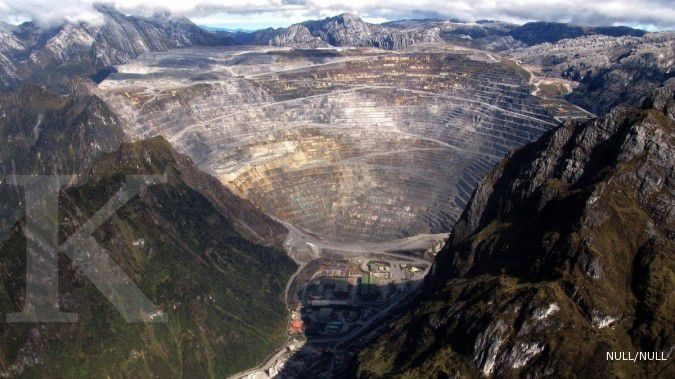JAKARTA. Less than three months before the administration of President Susilo Bambang Yudhoyono is due to leave office, it sealed a strategic deal on Friday with the local unit of US giant miner Freeport-McMoRan Inc., which ensured the company would continue to operate after its license expires in 2021.
The government signed a memorandum of understanding (MoU) with PT Freeport Indonesia despite previous pledges from Yudhoyono to the contrary. He had said that should he be forced to do so he would meet the president-elect for consultation and approval.
Energy and Mineral Resources Ministry director general for minerals and coal R. Sukhyar and Freeport Indonesia president director Rozik Soetjipto signed the MoU, which will serve as the legal basis for the next government’s amendment of the miner’s contract of work (CoW).
“The MoU has been signed [...] the amendment of the CoW should be made six months after the signing,” said Sukhyar.
Such a policy will eventually leave president-elect Joko “Jokowi” Widodo, scheduled to be sworn in on Oct. 20, with less room to reform the amendment, particularly when many politicians accused Freeport of exploiting resources without giving enough back to Indonesia.
Under the MoU, Freeport can continue its operations after its contract expires in 2021. A clause in the MoU states that if Freeport meets its commitments, “the government will not unreasonably withhold or delay the continuation of its operations”, according to Sukhyar.
Operation continuity is Freeport’s primary concern as it needs to ensure that it gets a return on its investment after pouring in billions of dollars to tap more copper and gold in its Grasberg mine, located in Mimika regency, Papua. The mine holds the world’s biggest gold deposits.
Freeport, under the MoU, will also have hefty taxes eased when it exports semi-finished products once it agrees to provide US$115 million in surety bonds as part of its commitment to build a local smelter.
The company’s export tax will be set at 7.5 percent, lower than the industry average of 20 or 25 percent in 2014 and 60 percent by 2016.
“Freeport agreed to comply with our regulation; it agreed to pay surety bonds, build a smelter etc,. Because it agreed, therefore, the export tax will be in line with the progress of its smelter development. The more the progress, the lower the export tax, which will be zero percent when the smelter development has reached a point of no return,” Finance Minister Chatib Basri said.
Chatib added that the lower export duties would enable the company resumes exportation. This would improve the trade balance, and that the current-account deficit would decline and the rupiah would strengthen.
Under the recommendation, Freeport is allowed to export 756,300 tons of copper concentrate in second half of the year, valued at $1.7 billion, according to Sukhyar.
The MoU, which is the first to be sealed in the list of giant miners currently negotiating their contract amendments, was signed ahead of the week-long Idul Fitri holiday and while public attention is distracted by the presidential election.
Freeport’s Rozik played down concern and suspicion. “We have been doing this for two years and we need a deal so that we can move forward,” he said.
The MoU is legally binding and will have legal consequences for the new government, legal expert Todung Mulya Lubis said.
“A lame duck government usually cannot issue a policy that will bind the next government unless in an emergency situation. The decision should have been postponed as it raises suspicions,” Todung said.
Jokowi said on Friday that Yudhoyono had not consulted him. “The Freeport contract will expire in 2021. The current administration should not have sealed the deal,” Jokowi said.
Other key issues in the MoU
• Freeport pays higher royalties for copper — 4 percent from 3.75 percent — and 3.5 percent for gold from 1 percent
• Freeport to gradually sell a further 21 percent stake to the government within one year after the government revises its regulation on company divestment
• Freeport’s concession area will decrease to 122,00 hectares from 212,000 ha
(Raras Cahyafitri, Satria Sambijantoro, Sita Dewi)
/2012/11/26/1941642590p.jpg)










